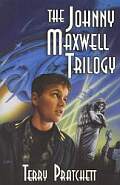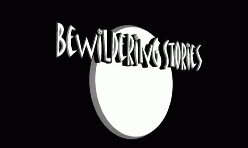Book Review:
Terry Pratchett,
The Johnny Maxwell Trilogy
by Jerry Wright

|
|
The Johnny Maxwell Trilogy Author: Terry Pratchett Publisher: The Science Fiction Book Club Hardcover: 408 pages ISBN: 1568656203 Price: (varies from $10.95 to $108.00) |
Back 1997 the Science Fiction Book Club released a compilation of the three "Johnny Maxwell" YA novels by Terry Pratchett. The books included are Only You Can Save Mankind (1992), Johnny And The Dead (1993) and Johnny And The Bomb (1996). It is fascinating and instructive to watch the growth of Terry Pratchett as a writer as we delve through these three books.
There is no question that Pratchett was a very funny and absorbing writer in 1992. His story of Johnny and a computer game where the oncoming opponents say "We surrender", and what happens next in the confluence of RealSpace and GameSpace is great fun and very thoughtful. It is also interesting to see the influence of the first Gulf War on Johnny and his friends. Some people have assumed from this that Pratchett is a pacifist. I think that is just too easy a pigeonhole to stick one of the most original writers of our generation.
Only You Can Save Mankind is a very well done juvenile; clever, thoughtful, and funny. And as such, stands head and shoulders above the majority of the YA books published in 1992. But it is actually quite a deep book. Terry talks about the concept in a 1994 interview reprinted at Misrule.com.
The interviewer, Judith Ridge, in juxtaposing Anhk Morpork and Johnny Maxwell said:
The Johnny books are more in the realist mode, and again, this is broad generalisation...
I think they are exactly in the realist mode if you are about 12 years old.
They also deal — now, I think that all your books have serious ideas lurking around — but I think you’ve brought them more to the front in the Johnny books. Do you agree? What prompted the change of approach anyway to a more realist mode, was it just that’s what the story needed?
That was what the story needed. I’m quite viciously straightforward about that. I couldn’t have written — Johnny and the Dead had to be set in a world which appeared to be the real world to have the effect it could. on Discworld, in Ankh-Morpork, the dead have a perfectly everyday role to play in the normal civilisation. Your milk may well be delivered by a zombie. As I say, in Ankh-Morpork, the fact that I have the classical races of horror and fantasy actually playing roles as citizens has its own pleasant connotations. The fact that your local butcher might be a vampire has no more or less comment than him being a Muslim. So there had to be a framework of conventional reality for both those books to work. In Only You..., for example, I actually was up late working when the Gulf War started, and I was also aware of how much an effect it had on kids, that despite apparently being inured by years of video games and Schwarzenegger movies, this is a real war, and they seem to understand it was a real war, more than adults did. They were actually afraid it was going to happen here, maybe because they were a bit locationally challenged, as far as the Gulf was concerned. And the thing that triggered Only You... was that I was having all the normal wishy-washy things that it’s not a nice idea to say "wow, look we can drop this bomb straight down this chimney" because 38 people you might like if you’d met in person have been laminated against the walls inside, but we don’t want to show you that, we’re going to show you the video. And then there was an interview, I think it was by CNN, with two pilots who’d just come back from over-flying the desert, and they were Americans. If the Brits had been interviewed it would have been "well, yes it was very regrettable, but yes, it was a successful flight." Because we’ve learned the stiff upper lip. But these Americans pilots come out like "Woh, it’s like a turkey shoot out there, we really kicked some butt, it’s like shootin’ cockroaches." Everyone was raising their hands in horror, and I watched this and a lot of people were saying how disgusting it was, to show this, and I thought, "They’re soldiers." And despite the fact that there was more or less air supremacy, I mean there were ak-ak guns, and they’d been doing what civilisation had been very specifically training them to do for years, and at any moment when they were out there there could have been a bang and their manhood could have gone past their face on a little column of white-hot metal, and they were at least sub-consciously aware of that. And when they came back, they were drunk, they were drunk with relief and testosterone, as soldiers always are after a battle. The only difference is that, after the Trojan wars or whatever, we never saw it television. And I thought it’s silly, I mean, what do you think soldiers are like? They’re humans, they come back and they’re safe, and that’s why in the book there’s a scene where all the kids in the class are discussing it, they’re all taking a view, and Johnny says, "Look, it’s more complicated than that. When they go up there they’re soldiers who might be dying. It’s just a whole lot more complicated than you think." That’s what war is, it isn’t so nicely clean-cut. And all these things sort of came together, and I thought I can do this in a children’s book, because children seem to be involved in all that. Children all seem to live between video games and video war very readily.
End of Interview
Brrrr. One begins to see why Terry Pratchett has been accused of being "guilty of literature".
In Pratchett's next "Johnny Maxwell" novel, he gets even better. Johnny And The Dead introduces Johnny and his friends to the Dead who live in a local cemetary that has just been purchased by a local conglomerate for 5 pounds and other considerations. And the Dead. Are they ghosts? When asked THAT question, the Dead become highly offended. Not on your life!
And book the third, Johnny And The Bomb? Johnny and his friends meet crazed bag-lady Mrs. Tachyon, and discover you can keep time in a bag. After reading the first two books, this one just piled conundrum on top of philosophical head-spinning. But did it in such a way, that your average 12/13-year old teenager will still love it and get a rush out of it.
The Bomb? Oh yeah, welcome back to the London Blitz, and alternate timetracks.
My reaction: as Mrs. Tachyon said, "That's the stuff to give the troops. Bromide? That's what YOU think. Laugh? I nearly brought a tractor!"
Copyright © 2005 by Jerry Wright and Bewildering Stories

